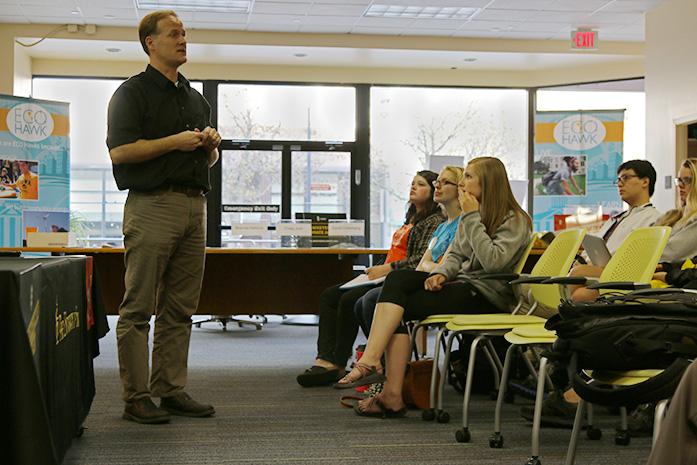Through policy and practice, local experts showed that climate change is being addressed at the federal, state, and local levels.
The student organization Iowa NextGen Climate hosted a panel discussion on Wednesday as a part of Earth Week. NextGen Climate is a national, nonpartisan political-action committee with a goal of generating 50 percent of U.S. energy from renewable sources by 2030.
Panelists included Craig Just, a University of Iowa assistant professor of civil and environmental engineering, David Osterberg, UI a clinical professor of occupational & environmental health, and Brenda Nations, the Iowa City sustainability coordinator.
Each of the panelists discussed what their work and research is progressing in relation to climate change.
Just spoke about the Iowa Watershed Approach, a $96.9 million program to improve resilience for Iowa communities that are at risk of being damaged by floods.
“Rainstorms are becoming more extreme and more frequent in Iowa; we’re already seeing that,” Just said. “We’re going to see floods more and more often if climate change isn’t mitigated.”
Osterberg’s presentation focused on more of a federal approach. He discussed the Clean Power Plan, a piece of legislation that requires all states to reduce their carbon-dioxide emissions from power plants by 32 percent by 2030.
Osterberg said Iowa has almost already achieved this; it gets 31 percent of its energy from wind. In addition to this, he said, a large regional energy company, MidAmerican, recently committed to investing $3.6 billion into further increasing its wind energy, with the hopes to bring Iowa’s wind energy up to 40 percent.
RELATED: Climate Narrative Project seeks to turn activism into art
This is also helping to achieve NextGen Climate’s goals, he said.
“We got to do things fast; we got to do some things to mitigate what’s coming,” Osterberg said. “You also have to think about 50 by 30, and you can get there, because Iowa is proving you can get there.”
Nations concluded the panel with describing how Iowa City is mitigating and adapting to climate change on a local level. The city was recently given a 4-STAR rating in sustainability, which, Nations said, indicates where the city is doing well and where it can improve in terms of sustainability.
“The city has been going along with assessments and seeing where we’re weak and where we can do better and planning to eliminate those things,” Nations said.
She said the city is committed to mitigating climate change and working toward sustainability in a number of ways. For example, getting buildings certified as “Leadership in Energy and Environmental Design” and installing LED lights wherever possible.



